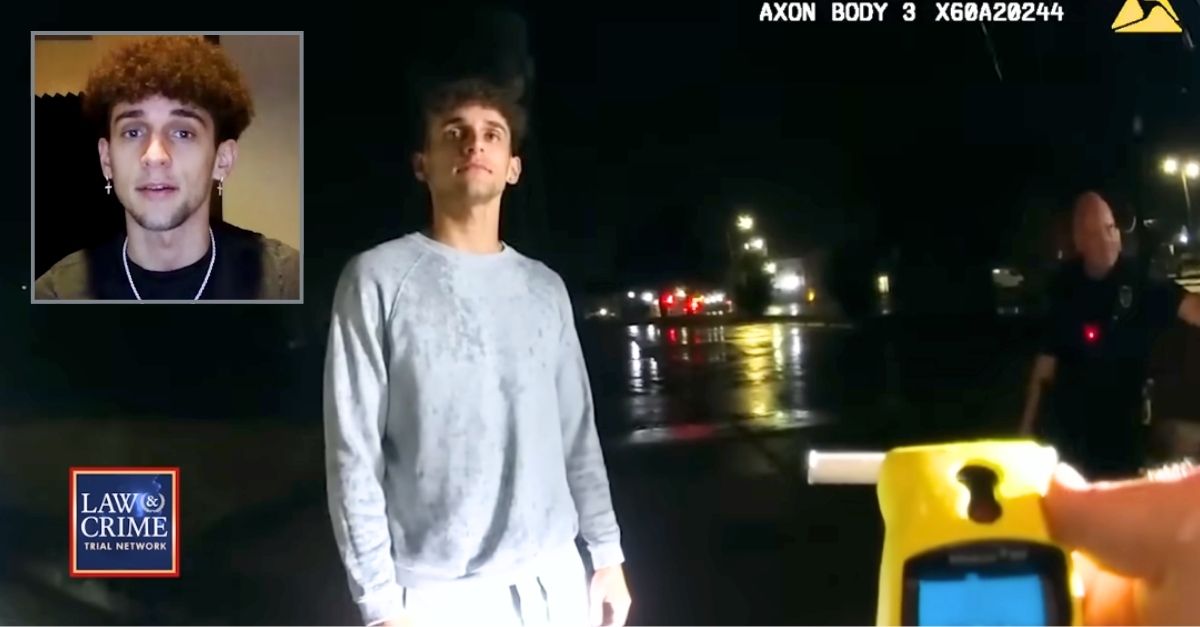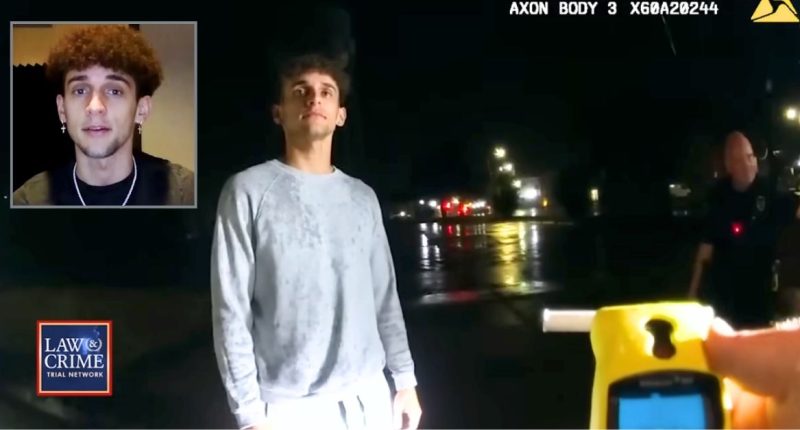
Background: Tayvin Galanakis is seen on bodycam footage during his Aug. 28, 2022 arrest (Law&Crime). Inset: Galanakis speaks with Law&Crime about his arrest and lawsuit (Law&Crime).
An Iowa man who was arrested for allegedly driving while intoxicated — despite having a blood-alcohol level of zero — can pursue his lawsuit against the city and the police officers who put him in handcuffs.
Tayvin Galanakis, who was 19 at the time of his arrest in 2022, can continue his lawsuit against the city of Newton and three police officers, a federal appeals court ruled Thursday. As Law&Crime previously reported, Galanakis was pulled over by police in Newton, a city located 30 miles east of Des Moines, after he was apparently spotted driving with his car’s brights illuminated on Aug. 28, 2022. Galanakis told officers that one of his headlights was out, and he turned on his high beams to compensate, as it was raining and difficult to see.
Police body camera shows officers giving Galanakis multiple field sobriety tests before eventually having him provide a breath test, in which Galanakis was deemed to have a 0.00 blood alcohol level.
“I blew zero!” Galanakis is heard saying on the body camera footage, which also captures the breath detection readout of “0.00.”
At that point, as seen and heard on the body camera footage, the officers shifted the focus to whether Galanakis had smoked marijuana that night. Galanakis denied this, telling the officers that as a football player for William Penn University near Oskaloosa, he was regularly tested for drugs. Nevertheless, Galanakis was put in handcuffs, arrested, and brought into custody.
He was eventually released after a drug evaluation at the police station determined that he was not under the influence of any illicit substances.
In 2023, Galanakis, now 21, sued the city of Newton, along with police officers Rob Burdess, Nathan Winters, and Christopher Wing, alleging civil rights violations for arresting him without probable cause. U.S. District Judge Stephen Locher, a Joe Biden appointee, denied the defendants’ claim of qualified immunity, finding that it does not extend to violations of constitutional rights. The judge found that, given the facts, Galanakis would likely prove at trial that due process violations occurred during his arrest. Locher also allowed one of multiple defamation counterclaims by Winters, over comments Galanakis made about him on social media, to stand.
In a 12-page decision, three judges for the 8th U.S. Circuit Court of Appeals upheld the lower court’s ruling.
“[A]ccepting the facts found by the district court, no officer could reasonably conclude that there was a substantial chance that Galanakis was under the influence of marijuana,” the judicial panel wrote.
The opinion, written by U.S. Circuit Judge Jane Kelly, a Barack Obama appointee, went on to say that Galanakis’ behavior as seen on Winter’s own body camera footage suggested just the opposite of what police had alleged, noting that the teen’s sharp comebacks to the officer’s questions indicated that he was, indeed, quite sober.
“Galanakis’s movements and behavior captured on Winters’s body camera footage suggest the opposite of intoxication,” the opinion said. “As the district court found, and as the footage shows, ‘Galanakis was moving confidently and directing subtle and not-so-subtle verbal jabs at Winters in a manner that would have been difficult for an impaired person.””
More from Law&Crime: ‘Flagrant error’: Alito slams Ninth Circuit for having ‘badly fumbled’ qualified immunity in case of fatal police shooting
The officers’ claim that Galanakis’ delayed response and occasional inconsistencies in response to the officers’ questions, in addition to their observations that he was chewing gum and had air fresheners in his car, as justifications for his arrest, also failed to hold up to the appellate judges.
“Weighed against the totality of the circumstances — namely, video of a lengthy stop in which Galanakis registers almost no outward indication of intoxication — no objectively reasonable officer could conclude that these isolated actions amounted to arguable probable cause to arrest Galanakis,” the opinion says. “Galanakis’s traffic violation, the air fresheners, and his brief difficulty finding documentation while simultaneously answering Winters’s questions are minimally suggestive of impairment.”
“That Galanakis did not completely follow Winters’s instructions on two of the sobriety tests — taking too many steps, and not turning or counting out loud in the ways instructed — also lends weak support for the inference that Galanakis was intoxicated,” the judges added.
Moreover, the judges noted that the district court found Galanakis’ answers to the officers’ questions “were detailed and coherent.”
“By the time Galanakis was arrested, no objectively reasonable officer could have concluded that there was a substantial chance Galanakis had driven while under the influence of marijuana,” the ruling says.
Kelly was joined in the opinion by Chief U.S. Circuit Judge Steven Colloton and U.S. Circuit Judge Duane Benton, both George W. Bush appointees.
Neither the city of Newton nor lawyers for Galanakis immediately replied to Law&Crime’s request for comment.
Love true crime? Sign up for our newsletter, The Law&Crime Docket, to get the latest real-life crime stories delivered right to your inbox.
Sierra Gillespie contributed to this report.




